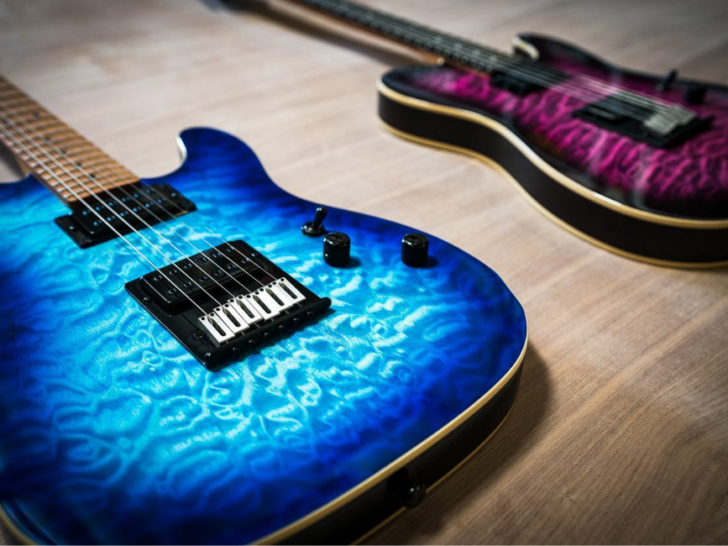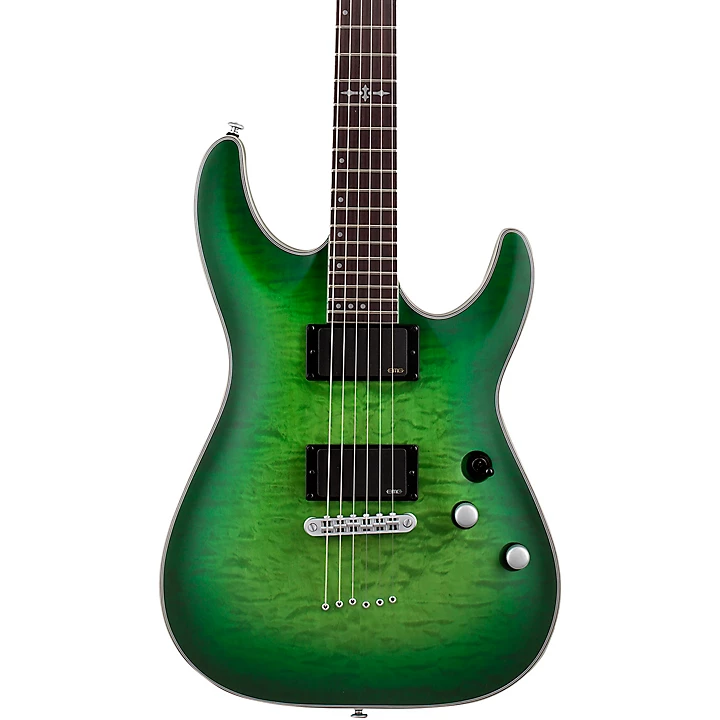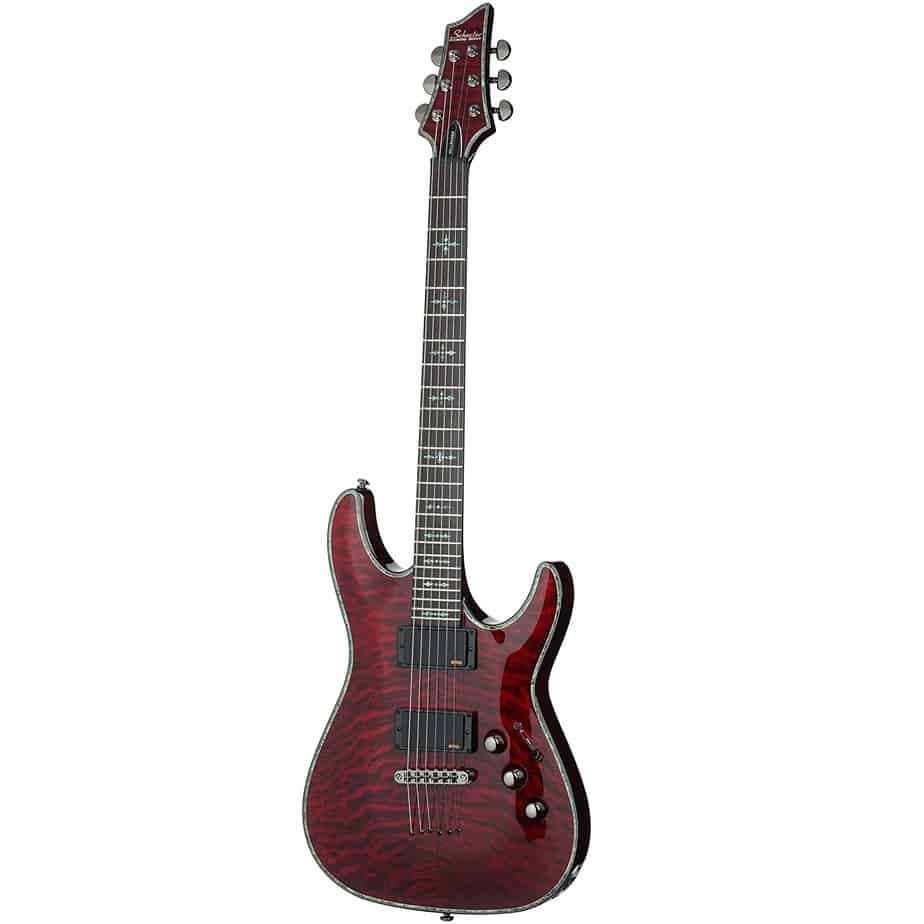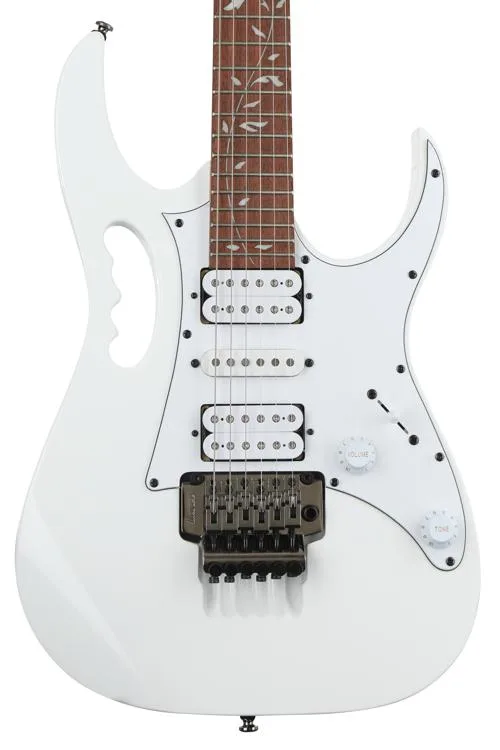As the guitar world got caught in the blaze of hair metal and 80s shredders, Schecter released its Diamond series, which even today offers quality rock and metal guitars at an affordable price.
The Diamond series is massive; thus, I prepared this Schecter Diamond series guide to help you find the best among the many.
My bottom line up-front: While other brands focus on
beginner or advanced instruments, Schecter is the best at making mid-made rock and metal guitars.
Schecter Diamond series guitars range from simple, straightforward metal machines to studio and stage-ready guitars. You won’t be disappointed, whether you need to improve on your first guitar, are looking for a guitar to mod, or want a high-quality heavy guitar for gigging under 1000$.
Best Schecter Diamond Series Guitar at a Glance
- Schecter C-1 Platinum (Guitar Center / Reverb) – Best Affordable Heavy Metal Guitar: The C-1 series is perfect for shredding on a budget. Its tonal range is limited but responds fabulously to everything with high gain.
- Schecter Omen Extreme 6 (Amazon / Sweetwater) – Best Affordable Heavy Rock Guitar: The Omen Extreme-6 is the perfect guitar for a shredder who likes a snappy, bright tone and uses more dynamics.
- Schecter Demon 7 (Guitar Center / Musicians Friend) – Best Affordable Seven String Guitar: The Demon proves that quality seven-string guitars don’t need to be expensive.
- Schecter C-1 Hellraiser (Amazon / Sweetwater) – Best Price/Quality Ratio: You can use the C-1 Hellraiser in every possible situation live and in the studio, and it will deliver.
- Schecter Nick Johnston Diamond Series (Sweetwater / Reverb) – Most Versatile Rock Guitar: This instrument is probably the best-sounding affordable heavy-duty Strat out there.
How Good Are Schecter Guitars?
Schecter guitars are equally suitable for
The brand has always been my go-to when I needed to do some heavy playing. Considering the fantastic price-quality ratio, I found it easier to frequently change guitars and not settle for only an expensive one until I needed to play metal songs in the studio. Even then, the higher-end Diamond series and custom shop models offered top-notch instruments for professionals that rival any big brand.
Even though the company might not be as big as Ibanez or Fender, it offers no less.
Interesting Read: Ibanez vs Schecter Guitar Brand Comparison.
Schecter Selection Criteria
We are talking shredding here, so the first aspect to consider is the guitar’s reliability. Out-of-tune whammy action and high action won’t be an issue with any of the guitars I have chosen, even though some are more stage-ready than others.
The main criteria I considered for the best Schecter Diamond Series guitars are:
- Reliability
- Playability
- Tone
- Versatility
- Price
Which Schecter Guitar Should You Pick?
Even the world of heavy guitar has its distinction. Not all Schecter guitars can play “anything” in the metal world, as some modern genres now require specific tunings, more strings, and all that comes with that.
If you’re a lead player, you will most likely be satisfied with all the guitars, besides some 7 and 8-string ones, which don’t do especially well in the high register if they are not expensive. I recommend that models have special cutaways for easy access to high frets to compensate for the struggle of playing with a longer scale length.
I suggest giving more importance to how well the guitar sounds and feels in the rhythm section. It’s easier to get a good lead tone with plenty of fx on an average guitar than getting palm and power chords to sound big.
Most affordable guitars tend to ‘break’ under a lot of gain and in low tunings. From experience in playing with metal bands live and in the studio, the best rhythm guitars are those that have more bite than low-end.
Up to a certain tuning, all Schecters will hold their intonation well. If you want to go 2-3 steps down, you must invest in models with the best locking systems.
Schecter C-1 Platinum: Best Affordable Schecter Guitar for Heavy Metal
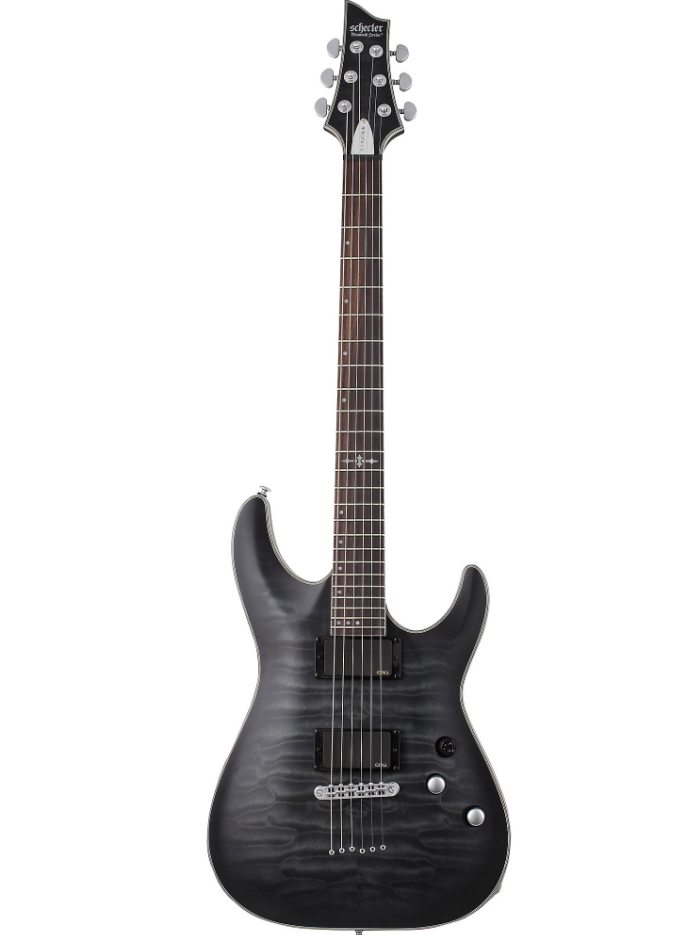
This guitar is one the best value EMG-packed mean locking metal guitars you can buy today. It has all the basics covered for fast shredding and heavy rhythm playing.
It’s a straightforward guitar with one volume, tone control, and a standard 3-way switch. I don’t necessarily find that a weakness; sacrificing some versatility had Schecter focusing only on making it comfortable to play, reliable and heavy.
It stays in tune well, yet I would have preferred if it had locking tuners to make restringing and stable down tuning easier. The reseed heil is a brilliant choice to make high frets easy to access.
I like the pickups for heavy rhythms and when you need to have a ton of sustain for your pull-offs and hammer-ons to sound clean. However, EMGs often come with a price; combine them with the warm mahogany body, and you get a muddy tone very quickly if you don’t know what you are doing.
This guitar could become a much more useful metal beast with different pickups and pots.
Want to know more about the Schecter C-1 Platinum? Read our complete review here.
Specs
- Mahogany body
- 25.5″ scale length:1.653″ nut width
- Set Maple neck with thin C-profile
- Rosewood fretboard with 24 X-Jumbo frets
- Dual EMG 81/85 active humbuckers, 3-way switch
- Locking Tuners and Tune-O-Matic w/ String Thru Body
- 1x volume and tone control
The Schecter C-1 Platinum Electric Guitar takes everything guitar players love about the popular C-1 and adds platinum fingerboard inlays, fretboard and body binding and satin chrome hardware.
Pros
- Great value
- Great heavy tone
- Very reliable
- Comfortable to play down and up the neck
Cons
- It’s a heavy guitar to hold
- Gets muddy quickly
- Not very versatile
Schecter Omen Extreme-6: Best Affordable Schecter for Heavy Rock
The Omen Extreme-6 is my top choice for intermediate players in the rock and metal world. The more versatile pickups make it able to pull through both a rock concert and thrash metal gig with brilliant results.
The guitar has a lot of snap due to the maple neck and string through body design. Where the C-1 fails to deliver, the Omen Extreme-6 is in its comfort zone. It won’t get muddy and kill the band’s mix while keeping good note separation on busy chords.
I especially like the thin C-shape neck, making it a good choice for every hand, and the split coil comes in handy on stage. From experience, I can assure you that the treble-y single coil sound is very useful for playing aggressive rhythms.
I would not advise buying this only if you play heavily down-tuned music. For all the rest, from Van Halen to Megadeth, it’s a mean, easy-to-play rock machine.
Specs
- Mahogany body with quilted Maple top
- 25.5″ scale length:1.653″ nut width
- Bolt-on Maple neck with thin C-profile
- Rosewood fingerboard with 24 X-Jumbo frets
- Tune-O-Matic Bridge with String-thru Body
- 2x Schecter Diamond Plus Humbucker
- 3-way switch; 2x volume; 1x master with coil split
Providing an array of tones for every musical mood, the Schecter Omen Extreme Electric Guitar is loaded with everything a guitar player could need to take their sound to the extreme.
Pros
- Versatile heavy rock guitar with a push/pull single-coil knob
- Good note separation on high gain
- Many color options
- Easy to play neck
Cons
- The clean tone sounds slightly compressed.
Schecter Demon 7: Best Affordable Schecter 7 String
The list would not be complete without a seven-string guitar. The world of added strings can sometimes be confusing regarding guitar specs, and there’s no one size fits all solution.
Some seven-string players who tune very low need only a perfectly intonated guitar that sounds heavy and is easy to play chugs with. Others that don’t go that down the scale want the same qualities: a six-string on the high and low register, with an extra string on top.
The Schecter Demon 7 is a good middle ground for the player between the two who is not yet playing professionally in either setting. It will serve you well in drop tunings and keep things tight in the high register. The built quality is excellent, and the set neck makes it extra reliable.
The only thing I dislike about the guitar is how fast it becomes muddy on high gain and low tunings, with anything apart from the bridge pickups sounding mushy. For some players, that’s fine, but overall I prefer it when more bite and note separation is happening. Also, don’t expect it to be 100% intonated if you go very low.
I suggest eventually changing the guitar pots to try and make the sound brighter. If that does not work, a different pickup will do the trick.
Specs
- Basswood body
- 26.5″ scale length:1.889″ nut width
- Bolt-on Maple neck with thin C-profile
- Rosewood fretboard with 24 X-Jumbo frets
- 2x Diamond Active HB-1055
- Locking Tuners and Tune-O-Matic w/ String Thru Body
- 3-way switch; 1x volume and tone control
With the famed Schecter C body shape, a fast maple neck with smooth wenge fingerboard with gothic cross inlays, the Demon-7 is waiting to unleash your music on the world.
Pros
- Excellent built quality
- Low action
- Great intonation on standard tunning
- It’s not heavy to hold
Cons
- Pickups quickly sound muddy on high gain
- Loses definition in extremely low tunings
- The cutaway is bothersome when playing beyond the 22nd fret.
Schecter C-1 Hellraiser: Best Schecter Mid Range Price + Quality
The Hellraiser is the metal guitar that has it all under 1000$. It’s a step above all the previous guitars I mentioned on the list and the most reliable on stage due to the locking mechanism.
There’s nothing that I dislike about the guitar plainly speaking. It’s excellent for metal and rock alike. If you’re the kind of player this guitar is meant for, you won’t ask for much more apart from the expensive features only signature models have.
This said I don’t find this guitar inferior to the custom models as it has the “edge” of a premium guitar.
I would only prefer it would clean up better when tweaking the volume knob. You only get very high only or low and not much in between. However, this is a perk a few metal guitarists use.
Check out our comprehensive Schecter Hellraiser Review.
Specs
- Mahogany body with quilted Maple top
- 25.5″ scale length:1.653 nut width
- Set Mahogany neck with thin C-profile
- Rosewood fretboard with 24 X-Jumbo frets
- Dual EMG 81/85 active humbuckers, 3-way switch
- Schecter Locking Tuners and TonePros TOM bridge with through-body construction
- 3-way switch; 2x volume;1x master tone
Schecter's Hellraiser C-1 lives up to its name. Not just because of its fiery red quilted maple top, but its screaming hot EMG active pickups, set mahogany neck, gothic cross inlays, and plenty more--perfect for veteran shredders and those about to rock.
Pros
- Very reliable on stage
- Versatile guitar with splittable coil
- Excellent heavy tone
- Classy finish and inlays
- Easy to play and access higher frets
Cons
- It does not clean up easily with the volume pot.
Schecter Nick Johnston Diamond Series: Most Versatile Schecter Guitar
Considering my background as a classic rock player, my favorite guitar of the series is the Nick Johnson signature model. If you’ve listened to his music, you know you need an absurdly versatile axe to do what he does. He chose a Stratocaster, the most versatile guitar model, as inspiration for his Schecter.
I’d say that this guitar is 70% a Stratocaster with a 30% input from Schecter to make it fit for shredding and heavy rhythm. That’s why I think it’s fantastic! There’s much you can improve on a quality Strat, and borrowing from it is the wisest choice.
The tone is snappy, very punchy, and most importantly, can go from crips clean to aggressive with a bite only by tweaking the volume knob. If you want to go crunchy, the SSS option is perfect. For heavier players, you can choose the HSS, which helps handle more gain up to a certain limit.
Specs
- Alder body
- 25.5″ scale length:1.653 nut width
- Bolt-on roasted Maple neck with thin C-profile
- Ebony fretboard with 22 X-Jumbo frets
- 3x Schecter Diamond Johnston Single-coil or 2x single coils with 1x Schecter Diamond ’78 Humbucker
- Schecter Locking Tuners and Diamond Vintage Tremolo
- 5-way switch; 1x volume;1x master tone
The tone is snappy, very punchy, and most importantly, can go from crips clean to aggressive with a bite only by tweaking the volume knob. If you want to go crunchy, the SSS option is perfect. For heavier players, you can choose the HSS, which helps handle more gain up to a certain limit.
Pros
- Excellent snappy aggressive rock sound
- It cleans up very well with the volume control
- Very versatile guitar with a vast tonal palette
- Easy to play and reliable
- It’s a light guitar
Cons
- It does not handle massive gain well, making it not fit for very heavy muted rhythms.
Schecter SeriesAlternatives to Consider
Schecter vs Ibanez
In perspective with Ibanez, probably the best-known heavy guitar manufacturer, Schecter does not lack behind in quality or variety of guitars.
Ibanez gets more credit because of its massive success in collaborating with legendary guitarists of multiple genres and the notoriety of its super Strat models. No Schecter guitar is more famous than Steve Vai’s Ibanez Gem.
Another area where Ibanez is superior is versatility. You could easily find Ibanez guitars with single coils and even excellent jazz guitars. On the other hand, Schecter focuses on rock and metal with few exceptions.
Schecter has Ibanez beat on the quality of its affordable models. The Diamond series is far more worth investing in than the Ibanez RG series. The pickups and built quality of the first sometimes compare to custom models, while you can immediately tell an affordable Ibanez from a flagship one.
Ibanez Steve Vai Signature JEMJR
Ibanez, Schecters’s biggest rival, offers plenty of affordable instruments that rival theirs in the rock and metal section. The brand’s most famous model is probably the Ibanez GEM, which also has a much cheaper counterpart, the JEMJR.
The GEM and JEMJR are completely different; however, the second is a fine guitar for intermediate players, especially the ones oriented toward lead playing. The thin and comfy neck is fantastic, while the Floyd is very steady, considering the price.
The downside to this instrument is that it cannot handle lower tunning well, and I find the pickups slightly harsh.
Steve Vai's signature guitars have become almost as iconic as the player himself, and now that mojo is more attainable than ever with the Ibanez JEMJR Steve Vai Signature solidbody electric guitar.
PRS SE Custom 24 Floyd Electric Guitar
PRS is close to being the ultimate guitar builder with the Custom 24 series of guitars. The affordable range, the SE series, consists of high-quality instruments that rival even flagship models of other brands.
I find the Floyd Rose fitted model of the SE series in pair with the Hellraisers in terms of build quality. The PRS is much better at handling low-gain genres as the pickups are less hot and better overall. The Hellraiser, on the other, does better in lower tunning and very heavy rhythms.
If you care to have a Floyd, I’d recommend the PRS.
The Paul Reed Smith SE Custom 24 solidbody electric guitar puts the sound, playability, and gorgeous looks of the Custom line into a more affordable instrument.
Charvel Joe Duplantier San Dimas Style
The surprise guitar of the day is a Telecaster turned into a riff machine. The guitar is inspired by Gojira’s frontman elegant classic taste in guitars and massive sound.
The Paul Reed Smith SE Custom 24 solidbody electric guitar puts the sound, playability, and gorgeous looks of the Custom line into a more affordable instrument.
All of Charvel’s focus went into making the guitar a gem for rhythm guitarists. The design is straightforward, but the guitar plays and sounds exceptionally well. It costs less than 700$, and it might become your favorite rhythm guitar.
Final Thoughts on Your Next Schecter Guitar
Are Schecter Guitars “Good”?
Yes, Schecter Research has a very solid reputation in the industry, particularly for their rock and metal guitars. Schecter is a step above the budget tiers, but still affordable and approachable for guitarists who’ve mastered the basics and want something more.
See below for some reasons why YOU should / shouldn’t purchase a Schecter based on your style and needs.
Why Should You Buy Schecter Diamond Series Guitars?
The value you get for the price and reliability are the main reasons I recommend a Diamond Series Schecter. For a similar price, it’s hard to get close to the pickups and the built quality they offer.
If you’re a
Schecters provides some of the best bodies for heavy tweaking if you like to mod guitars like me. The two most important criteria, the body and neck, are flawless.
Why Should You Avoid Schecter Diamond Series Guitars?
The main reason to avoid the Diamond series is if you need more versatility for lower gain playing. Apart from a few with low output pickups, most instruments are inclined to heavy genres and won’t serve as a blues or even rock guitar.
Apart from the Nick Johnstone signature model, I don’t think any other modern model could play a set of multiple genres that don’t include rock or metal. Overall the Diamond series makes fantastic guitars, but like most guitars with hot pickups, they won’t work as a jack-of-all-trades.
FAQs
Question: Where is the Schecter Diamond Series Made?
Answer: Schecter Diamond series guitars are made either in Indonesia, South Korea, or China, depending on the model.
Question: Which Schecter Guitars are US Made?
Answer: Only the custom shop series guitars are exclusively made in the US
Question: Who Plays Schecter Guitars?
Answer: Synyster Gates, Pete Townsend, Mark Knopfler, Ritchie Blackmore, Chris Poland, and Nick Johnstone, among others, use Schecter guitars.
- Do you Actually Need a Trembucker? Humbucker vs Trembucker - May 11, 2024
- Best Headphones for Guitar Amp Guide - April 23, 2024
- Takamine vs Martin Comparison – US-Made Legacy Against Japanese Precision - March 30, 2024

